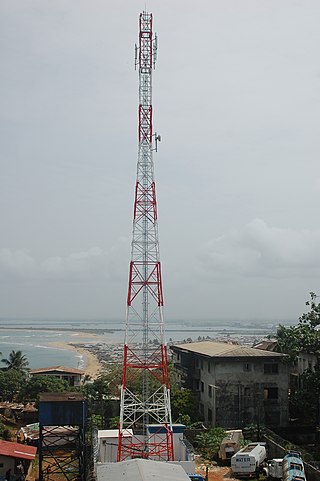Related Research Articles

Mass media in Liberia include the press, radio, television, fixed and mobile telephones, and the Internet.
Telecommunications in Senegal include radio, television, fixed and mobile telephones, and the Internet.
The mass media in Mali includes print, radio, television, and the Internet.
Mass media in Morocco includes newspapers, radio, television, and Internet.

Algeria has more than 45 independent Arabic language and French language publications as well as 4 government-owned newspapers, but the government controls most printing presses and advertising. The Algerian newspapers with the largest circulations are Echourouk (1,800,000), Ennahar (1,600,000), El Khabar (1,000,000) and Quotidien d'Oran (700,000); all four are employee-owned. In 2004 and 2005, the government increased the access of Berber language and culture to both print and broadcast media.

Mass media in Kenya includes more than 91 FM stations, more than 64 free to view TV stations, and an unconfirmed number of print newspapers and magazines. Publications mainly use English as their primary language of communication, with some media houses employing Swahili. Vernacular or community-based languages are commonly used in broadcast media; mostly radio.
Mass media in Niger is a diverse collection of public and private entities, both print and broadcast, centered in the capital of Niamey, but with vibrant regional centers. The media has historically been state funded, and focused on radio broadcast media, as the nation's population is spread over great distances. Niamey boasts scores of newspapers and magazines, many of which are fiercely critical of the government. These papers though have very small circulations, and almost none outside the cities.
Le Quotidien is a major independent daily newspaper in Senegal, based in the capital of Dakar. It also publishes a glossy weekly, entitled Week end.
The media of Zimbabwe has varying amounts of control by successive governments, coming under tight restriction in recent years by the government of Robert Mugabe, particularly during the growing economic and political crisis in the country. The Zimbabwean constitution promotes freedom of the media and expression, however this is hampered by interference and the implementation of strict media laws. In its 2008 report, Reporters Without Borders ranked the Zimbabwean media as 151st out of 173.

The mass media in Ghana, includes television, radio, internet publishing and newspapers.

Mass media in Burundi mainly consists of radio, television, and printed resources, with a project underway to improve internet access to the country. Most mass media in Burundi is controlled by the government, and access to international mass media is limited.
The mass media in Cameroon includes independent outlets. The nation has only one national newspaper, which is state owned.
Mass media in Chad is controlled by the government.
Mass media in Ivory Coast is controlled by the government. Audiovisual communications are regulated by the Conseil national de la communication audiovisuelle (CNCA), an administrative arm of the national government.
The mass media in Gabon is primarily monitored by the Gabon government. Although the main newspapers are associated with the government, there are private broadcasters, and private weekly newspapers that are mostly controlled by opposition parties.
The mass media in Mauritania is undergoing a shift into a freer journalistic environment, while becoming increasingly open to private sector.
The following is a timeline of the history of the city of Dakar, Senegal.
Mass media in Togo includes radio, television, and online and print formats. The Agence Togolaise de Presse news agency began in 1975. The Union des Journalistes Independants du Togo press association is headquartered in Lomé.
References
- 1 2 3 4 5 Senegal Country Commercial Guide 2008 Archived May 7, 2009, at the Wayback Machine . U.S. Commercial Service (2008).
 This article incorporates text from this source, which is in the public domain .
This article incorporates text from this source, which is in the public domain .
